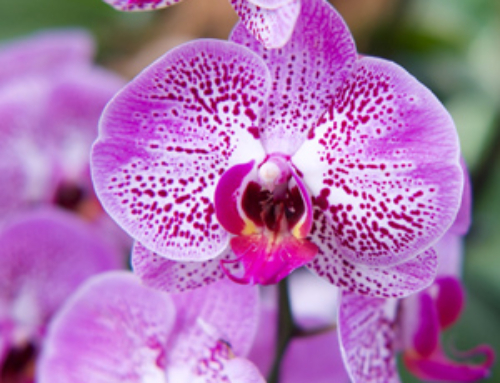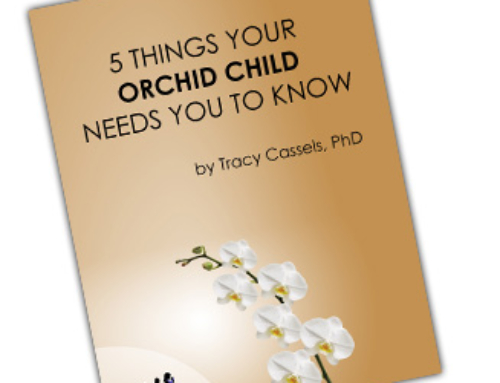The following is the copy for the above video for those who prefer to read:
Hello and welcome to Evolutionary Parenting with Tracy Cassels, PhD. I am Tracy and today I am going to talk a bit about the Orchid Child. Some of you may not be familiar with this term, but this is a term that refers to a child that is highly affected by his or her environment.
These children are often seen as more difficult because they are more sensitive than their peers, struggle more, require more from parents, and generally seem needier. Historically we may have referred to these children as high-needs, highly sensitive, or intense. However, the term orchid was not chosen blithely nor was it chosen to try and help parents feel better about having such a child.
The term was chosen specifically because research finds that these children are very much like orchids – they require intense care from parents and rather specific environments with respect to responsivity and sensitivity in order to thrive. Like the orchid, if the environment isn’t good, the child will wither because these children are highly sensitive to their environment.
This carries with it both good and bad news. The bad news is: These children are far more susceptible to negative outcomes like addiction, depression, anxiety, and so on. They can be the kids who face challenges and seem to wither. They can be the adults who hear criticism and it shatters their very core. But there is good news.
However, the good news is that when these same children receive positive environments and support catered to them (that is, it is responsive and sensitive to their needs), they can become some of the most creative, empathic, emotionally aware, and moral people walking the earth. Seriously.
And importantly, it doesn’t all happen when they are young – you can make mistakes and overcome this later if your child starts showing signs of going downhill.
This is why they are called orchids. They will wither or thrive based on their environment in contrast to dandelions who can also wither or thrive, but it seems to have far less to do with the environment they find themselves in.
Of course, this makes it incredibly hard for parents who are parenting in a society that does not value the type of sensitive and responsive parenting that is needed for orchid children. As babies, the orchid often needs regular contact and support, while parents are told to put the kid down and let them learn independence.
As children, the orchid can struggle with school and fall down a rabbit hole of being labeled all sorts of things which then diminish the child’s sense of self, and parents are never told that their child may just need a different environment than what they are in.
As teens, the orchid can be at a much higher risk for anxiety as they navigate the very difficult social world facing teens, and while parents worry about this, they often are told their teens need to toughen up.
Our society does not support orchids, nor does it support their parents. But if, as parents, you know that your orchid child requires more from you, hopefully you can feel better telling others to get lost and parent your child the way your child requires. Now what that looks like is another topic altogether.
For more information on orchid children, I strongly recommend reading ‘The Orchid and the Dandelion” by W. Thomas Boyce, PhD (affiliate link)



[…] Read more: https://gku.flm.mybluehost.me/evolutionaryparenting.com/understanding-the-orchid-child/ […]
Amazing. Thank you.
Thank you so much for sharing your expertise and valuable knowledge. I am a school teacher who works at a mental health school for students age 5-18 years of age. I have forwarded your link to our principal as I feel this information is valuable. Thank you.
Kind regards
Jenine Kerr
Thank you so much! I do feel more understanding of orchids in schools is necessary (maybe I need to create something!!). I love that you’re sharing this so they can have the best school experience possible!
Thank you for this. Orchid child is a term I’ve come across only recently. I always wondered why parenting my eldest (now 4) is such bloody hard work. I thought it was maybe my fault for doing all the gentle parenting stuff. Thankfully not.
I felt exactly the same about our 5.5 year old – bloody hard work is 100% right! Hard for other parents to understand just how challenging it can be when you have a 5 year old that still has periods of time (often weeks at a time) where they wake 3-5 times a night – triggered by something that someone said to them at school.
Is an orchid child the same as an autistic child ?
Nope. There are some similar traits, but they are qualitatively different and there are EEG studies that show the brain behaves very differently in these two groups.
Is it considered a medical condition? How to identify orchid child from just a sensitive, attached child?
You can check out the book ‘The Orchid and the Dandelion’ by Thomas Boyce or you can look for more resources here if you get the orchid guide.